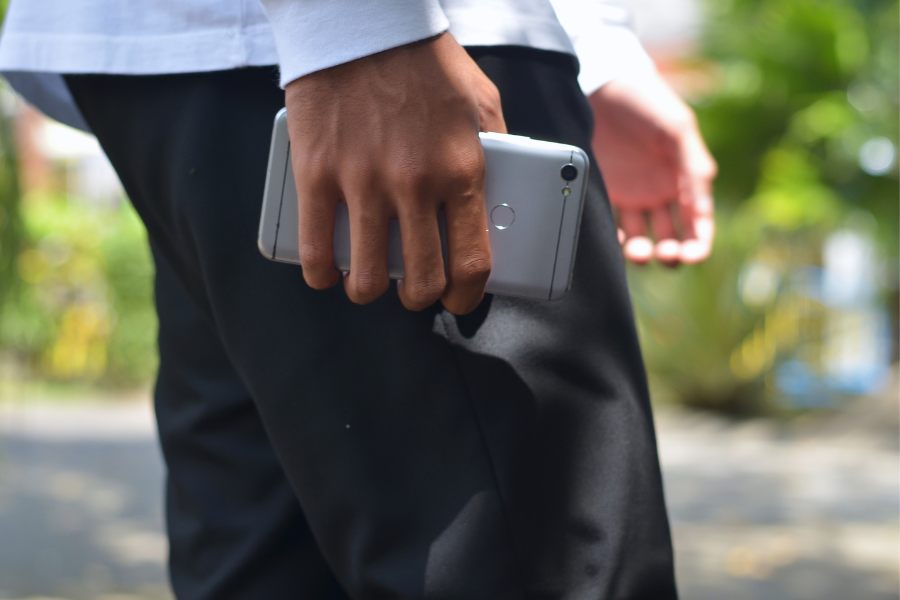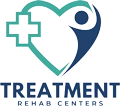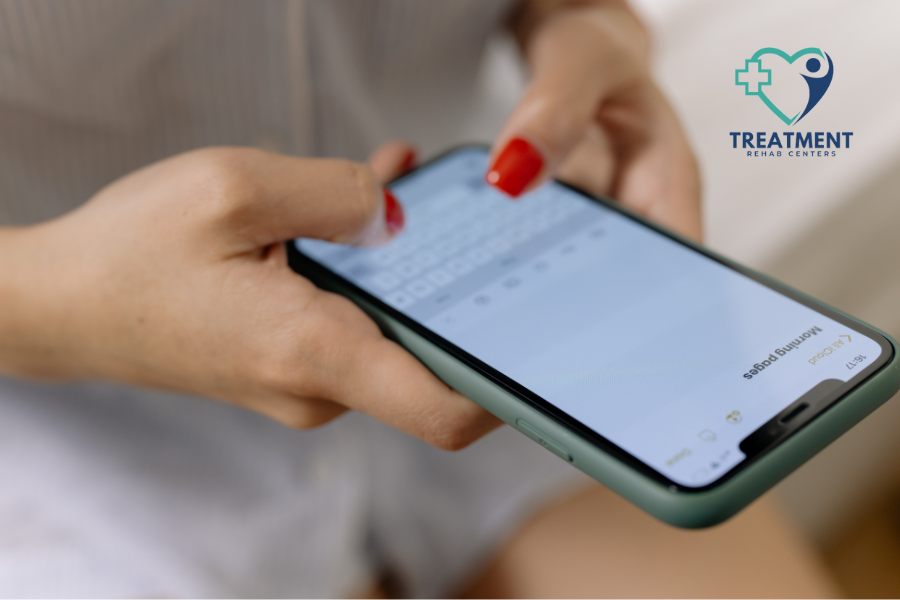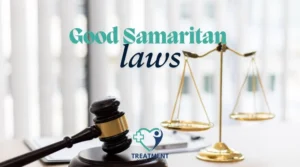In today’s always connected world, the idea of being separated from our phones can be anxiety-inducing for many of us. This becomes especially true when considering entering an addiction treatment program for substance abuse or mental health issues where minimizing anxiety is key to recovery.
One of the most common questions we get at TreatmentRehabCenters.org is, “Can you bring your phone to rehab?”
The answer isn’t always a simple yes or no as policies vary from center to center. Let’s get into this and break down the tech rules in rehab.
The Overall Philosophy on Phones in Treatment Centers
Most treatment centers have some kind of phone restriction, especially at the beginning of treatment. But the specifics vary from center to center. Here are some common approaches:
- No phones at all
- Limited phone time during certain hours
- Gradually introducing phones as treatment progresses
- Dumb phones for basic communication
Remember these policies aren’t random. They’re for your recovery. It’s important to contact the treatment facility beforehand to understand their specific rules regarding phone use.
Why Do Rehabs Limit Cell Phone Use?

1. Reducing Distractions
The main purpose of rehab is to focus on your recovery. Cell phones with their constant notifications and social media can be big distractions from this work.
2. Blocking External Triggers
For many in recovery, especially those with drug and alcohol addiction, phones can be a trigger. These might be:
- Contacts associated with substance use
- Social media posts about alcohol or drug use
- Stressful news or work emails
3. Promoting Present Moment Awareness
Many therapeutic approaches focus on mindfulness and being present. Constant connection to the outside world through a smartphone can get in the way of this.
4. In Person Connections
Building connections with peers in a treatment center is a big part of the recovery process. Excessive phone use can isolate individuals and prevent them from fully engaging with their treatment community.
5. Privacy
In group settings phones with cameras can be a privacy risk for other patients. Many centers ban phones to ensure a confidential and safe environment for everyone.
The Benefits of Going Dark in Substance Abuse Rehab
Giving up your phone might seem scary but many find going dark in drug rehab to be beneficial:
- Less Anxiety: Without the constant stream of information and social media comparisons, people feel calmer.
- Better Sleep: No blue light from screens and late night scrolling means better sleep.
- More Focus: Fewer distractions means patients can focus more on their recovery work.
- Real Connections: Face to face interactions become more meaningful without the buffer of digital communication.
When Phones Are Allowed in Rehab
While many centers ban phones, there are times when limited phone use is allowed:
1. Outpatient Programs
Patients in an outpatient program have more flexibility with phone use since they’re not in a residential setting.
2. Later in Treatment
Some inpatient programs introduce phone privileges as patients get further in their recovery.
3. Special Circumstances
Centers may make exceptions for patients with drug or alcohol addiction, especially if they need comfort and support during rehab. They may also make exceptions for those who:
- Need to stay in touch with young children
- Have work responsibilities
- Dealing with legal matters
4. Therapeutic Purposes
In some cases phones may be used as part of therapy, like guided meditation apps or recovery support apps.
How to Stay Connected Without a Smartphone
If you’re going into a program that bans cell phones, there are still ways to stay connected:
- Landline Calls: Many centers have landline phones available during certain hours.
- Supervised Computer Use: Some programs allow limited, supervised internet access for important calls.
- Letters and Cards: Old school written correspondence can be a great way to stay in touch with loved ones.
- Family Visits: Many treatment centers have visitation policies to allow in person connections.
Before You Go Phone Free
If you’re going into treatment and the program doesn’t allow phones here’s what to do:
- Notify Key People: Let important people in your life know you’ll be unreachable.
- Set Up Auto-Responses: Create email and text auto-responders explaining you’re away.
- Delegate Tasks: Arrange for someone to handle any critical decisions or tasks in your absence.
- Bring Downtime Activities: Pack books, journals or puzzle books to fill time.
- Look at it as a Gift: Try to see this as an opportunity to focus on yourself and your personal growth.
The Future of Phone Policies in Treatment
As technology advances, so do the policies around phone use in treatment, with a focus on how the treatment plan can be customized to each individual. Some of the trends emerging:
- Smart Devices with Limited Functionality: Some centers are providing patients with devices that have limited recovery focused apps and features.
- Digital Detox Programs: Programs that specialize in helping people develop healthier relationships with technology.
- Tech Education: Teaching patients how to use their smartphones and social media in a way that supports their recovery.
Choose Wisely for Your Recovery
In the end, the decision to go into treatment should be based on the quality of care and the approach that’s right for you. While the phone policy is something to consider, it shouldn’t be the only factor in choosing a treatment center. American Addiction Centers has resources and support to help you make the right choice for your recovery.
Remember, the goal of rehab is to give you the best environment for healing and growth. Sometimes that means disconnecting from the outside world to focus on your inner work.
Putting Your Recovery First
The question “Can I have my phone in rehab?” doesn’t have a one answer. What matters most is finding a treatment program that fits your recovery goals and provides the support you need to heal, especially when it comes to alcohol addiction.
If you’re considering treatment and have questions about phone policies or any other aspect of treatment, reach out. The friendly team at TreatmentRehabCenters can help you with that and find the right path for your recovery.
Call now for a free consultation. Your recovery is a phone call away and we’re here for you every step.
Remember, while technology is a great tool, true connection and healing happen when we’re fully present with ourselves and others. Your recovery deserves your full attention – and sometimes that means putting the phone down.
Technology Policies in Addiction Treatment
In today’s always connected world, the idea of being separated from our phones can be anxiety-inducing for many of us. This becomes especially true when considering entering an addiction treatment program for substance abuse or mental health issues where minimizing anxiety is key to recovery.
One of the most common questions we get at TreatmentRehabCenters.org is, “Can I bring my phone to rehab?”
The answer isn’t always a simple yes or no as policies vary from center to center. Let’s get into this and break down the tech rules in rehab.
The Overall Philosophy on Phones in Treatment Centers
Most top rehab centers have some kind of phone restriction, especially in the beginning of treatment. But the specifics vary from center to center. Here are some common approaches:
- No phones at all
- Limited phone time during certain hours
- Gradually introducing phones as treatment progresses
- Dumb phones for basic communication
Remember these policies aren’t random. They’re for your recovery.
Why Do Rehabs Limit Cell Phone Use?

1. Reducing Distractions
The main purpose of rehab is to focus on your recovery. Cell phones with their constant notifications and social media can be big distractions from this work.
2. Blocking External Triggers
For many in recovery, especially those with drug and alcohol addiction, phones can be a trigger. These might be:
- Contacts associated with substance use
- Social media posts about alcohol or drug use
- Stressful news or work emails
3. Promoting Present Moment Awareness
Many therapeutic approaches focus on mindfulness and being present. Constant connection to the outside world through a smartphone can get in the way of this.
4. In Person Connections
Building connections with peers in a treatment center is a big part of the recovery process. Excessive phone use can isolate individuals and prevent them from fully engaging with their treatment community.
5. Privacy
In group settings phones with cameras can be a privacy risk for other patients. Many centers ban phones to ensure a confidential and safe environment for everyone.
The Benefits of Going Dark in Substance Abuse Rehab
Giving up your phone might seem scary but many find going dark in drug rehab to be beneficial:
- Less Anxiety: Without the constant stream of information and social media comparisons, people feel calmer.
- Better Sleep: No blue light from screens and late-night scrolling means better sleep.
- More Focus: Fewer distractions mean patients can focus more on their recovery work.
- Real Connections: Face-to-face interactions become more meaningful without the buffer of digital communication.
When Phones Are Allowed in Rehab
While many centers ban phones, there are times when limited phone use is allowed:
1. Outpatient Programs
Patients in an outpatient program have more flexibility with phone use since they’re not in a residential setting.
2. Later in Treatment
Some inpatient programs introduce phone privileges as patients get further in their recovery.
3. Special Circumstances
Centers may make exceptions for patients with drug or alcohol addiction, especially if they need comfort and support during rehab. They may also make exceptions for those who:
- Need to stay in touch with young children
- Have work responsibilities
- Dealing with legal matters
4. Therapeutic Purposes
In some cases, phones may be used as part of therapy, like guided meditation apps or recovery support apps.
How to Stay Connected Without a Smartphone
If you’re going into a program that bans cell phones, there are still ways to stay connected:
- Landline Calls: Many centers have landline phones available during certain hours.
- Supervised Computer Use: Some programs allow limited, supervised internet access for important calls.
- Letters and Cards: Old-school written correspondence can be a great way to stay in touch with loved ones.
- Family Visits: Many treatment centers have visitation policies to allow in-person connections.
Before You Go Phone Free
If you’re going into treatment and the program doesn’t allow phones here’s what to do:
- Notify Key People: Let important people in your life know you’ll be unreachable.
- Set Up Auto-Responses: Create email and text auto-responders explaining you’re away.
- Delegate Tasks: Arrange for someone to handle any critical decisions or tasks in your absence.
- Bring Downtime Activities: Pack books, journals or puzzle books to fill time.
- Look at it as a Gift: Try to see this as an opportunity to focus on yourself and your personal growth.
The Future of Phone Policies in Treatment
As technology advances, so do the policies around phone use in treatment, with a focus on how the treatment plan can be customized to each individual. Some of the trends emerging include:
- Smart Devices with Limited Functionality: Some centers are providing patients with devices that have limited recovery-focused apps and features.
- Digital Detox Programs: Programs that specialize in helping people develop healthier relationships with technology.
- Tech Education: Teaching patients how to use their smartphones and social media in a way that supports their recovery.
Choosing a Treatment Center Based on its Programs
In the end, the decision to go into treatment should be based on the quality of care and the approach that’s right for you. While the phone policy is something to consider, it shouldn’t be the only factor in choosing a treatment center.
TreatmentRehabCenters.org has resources and support to help you make the right choice for your recovery.
Remember, the goal of rehab is to give you the best environment for healing and growth. Sometimes that means disconnecting from the outside world to focus on your inner work.
Phones Are Often Accessible But Treatment is the Priority
The question “Can I have my phone in rehab?” doesn’t have one single answer. What matters most is finding a treatment program that fits your recovery goals and provides the support you need to heal, especially when it comes to alcohol addiction.
If you’re considering treatment and have questions about phone policies or any other aspect of treatment, reach out. The friendly team at TreatmentRehabCenters.org can help you with that and find the right path for your recovery.
Call now for a free consultation. Your recovery is a phone call away and we’re here for you every step.
Remember, while technology is a great tool, true connection and healing happen when we’re fully present with ourselves and others. Your recovery deserves your full attention – and sometimes that means putting the phone down.











